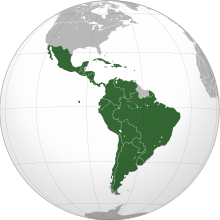
The environmental history of Latin America has become the focus of a number of scholars, starting in the later years of the twentieth century. But historians earlier than that recognized that the environment played a major role in the region's history. Environmental history more generally has developed as a specialized, yet broad and diverse field. According to one assessment of the field, scholars have mainly been concerned with "three categories of research: colonialism, capitalism, and conservation" and the analysis focuses on narratives of environmental decline.[1] There are several currents within the field. One examines humans within particular ecosystems; another concerns humans’ cultural relationship with nature; and environmental politics and policy.[2] General topics that scholars examine are forestry and deforestation; rural landscapes, especially agro-export industries and ranching; conservation of the environment through protected zones, such as parks and preserves; water issues including irrigation, drought, flooding and its control through dams, urban water supply, use, and waste water. The field often classifies research by geographically, temporally, and thematically.[3] Much of the environmental history of Latin America focuses on the nineteenth and twentieth centuries, but there is a growing body of research on the first three centuries (1500-1800) of European impact.[4] As the field established itself as a more defined academic pursuit, the journal Environmental History was founded in 1996, as a joint venture of the Forest History Society and the American Society for Environmental History (ASEH).[5] The Latin American and Caribbean Society for Environmental History (SOLCHA) formed in 2004.[6][7] Standard reference works for Latin American now include a section on environmental history.[8][9]
- ^ Carey Mark. "Latin American Environmental History: Current Trends, Interdisciplinary Insights, and Future Directions." Environmental History, April 2009, Vol. 14, No. 2 (APRIL 2009), p. 221
- ^ Taylor, Alan. "Unnatural Inequalities: Social and Environmental Histories." Environmental History vol. 1, no. 4 (Oct, 1996), p. 6.
- ^ McNeill, J.R. and Erin Stewart Mauldin, eds. A Companion to Global Environmental History. Wiley-Blackwell 2015.
- ^ Soluri, John, Claudia Leal, and José Augusto Pádua, "Finding the 'Latin American' in Latin American Environmental History" in A Living Past: Environmental Histories of Modern Latin America, eds. Soluri, John, Claudia Leal, and José Augusto Pádua. New York: Berghahn 2019, pp. 1-22.
- ^ American Society for Environmental History website 24 August 2020
- ^ La Sociedad Latinoamericana y Caribeña de Historia Ambiental website accessed 24 August 2020
- ^ Funes Monzote, Reinaldo. "The Latin American and Caribbean Society of Environmental History." Global Environment 1 (2008): 244–9.
- ^ Walkild, Emily. "Environment and Environmentalism" in A Companion to Mexican History and Culture. Wiley-Blackwell 2011, pp. 518-537.
- ^ Sedrez, Lise. "Environmental History of Modern Latin America" in A Companion to Latin American History, ed. Thomas H. Holloway. Wiley-Blackwell 2011, pp. 443-460.
